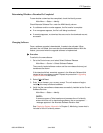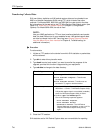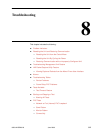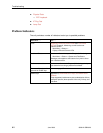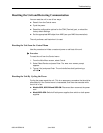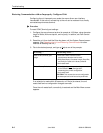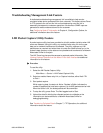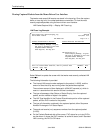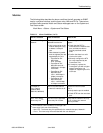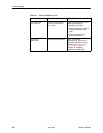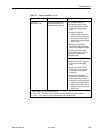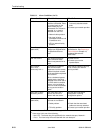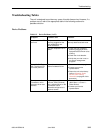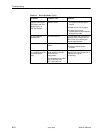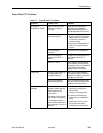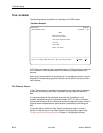
Troubleshooting
8-7
9820-A2-GB20-20
June 2000
Alarms
The following table describes the alarm conditions that will generate an SNMP
trap for a physical interface, and the frame relay LMIs and DLCIs. These alarm
conditions also generate Health and Status messages seen on the System and
Test Status screen.
Main Menu
→
Status
→
System and Test Status
Table 8-1. Alarm Conditions (1 of 4)
Alarm Condition
What It Indicates What To Do
Clock Out of Range at
Network
A valid port rate cannot be
detected because the:
H Unit is auto-rating on the
network data port, trying
to detect a valid port
rate.
H Rate detected is greater
than the highest port rate
supported by the unit.
– FrameSaver SLV
9820 rates:
64 or 128 kbps
– FrameSaver SLV
9820-2M rates: 64 –
2048 kbps in 64 kbps
increments
– FrameSaver SLV
9820-8M rates:
1024 – 8192 kbps in
8 kbps increments
– FrameSaver SLV
9820-45M rates:
1024 – 144210 kbps
in 8 kbps increments
If the message continues to
appear:
H Check that the DCE is
connected to the network data
port, and that the cable is
securely attached at both
ends.
H Confirm that there is a valid
clock on the cable.
H Manually configure the NTU
for a rate supported by the
FrameSaver unit.
H If necessary, replace the
FrameSaver unit with a higher
speed FrameSaver unit
capable of supporting the NTU
clock rate.
CTS down to
Port-1
Device
(Models 9820,
9820-2M, 9820-8M)
The CTS control lead on
the device’s interface is off.
Check DTR and RTS from
Port-1.
H Verify that the port is enabled.
H Check DTR from the user data
port.
DLCI
nnnn
Down,
frame relay link
1,2
The DLCI for the specified
frame relay link is down.
Verify that the network LMI is up.
If it is, contact your network
service provider.
1
nnnn
indicates a DLCI number of 16 through 1007.
2
frame relay link
is one of the following:
– Net1-FR1. The frame relay link specified for the network data port, Network 1.
– Port-1. The frame relay link associated with the user data port.



